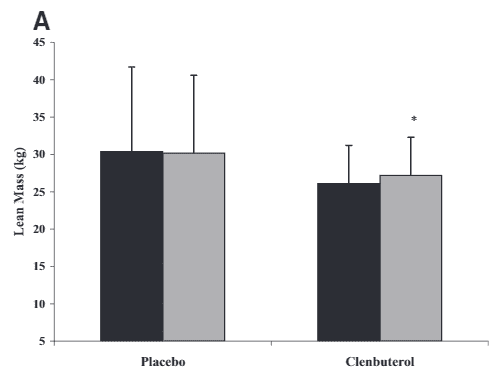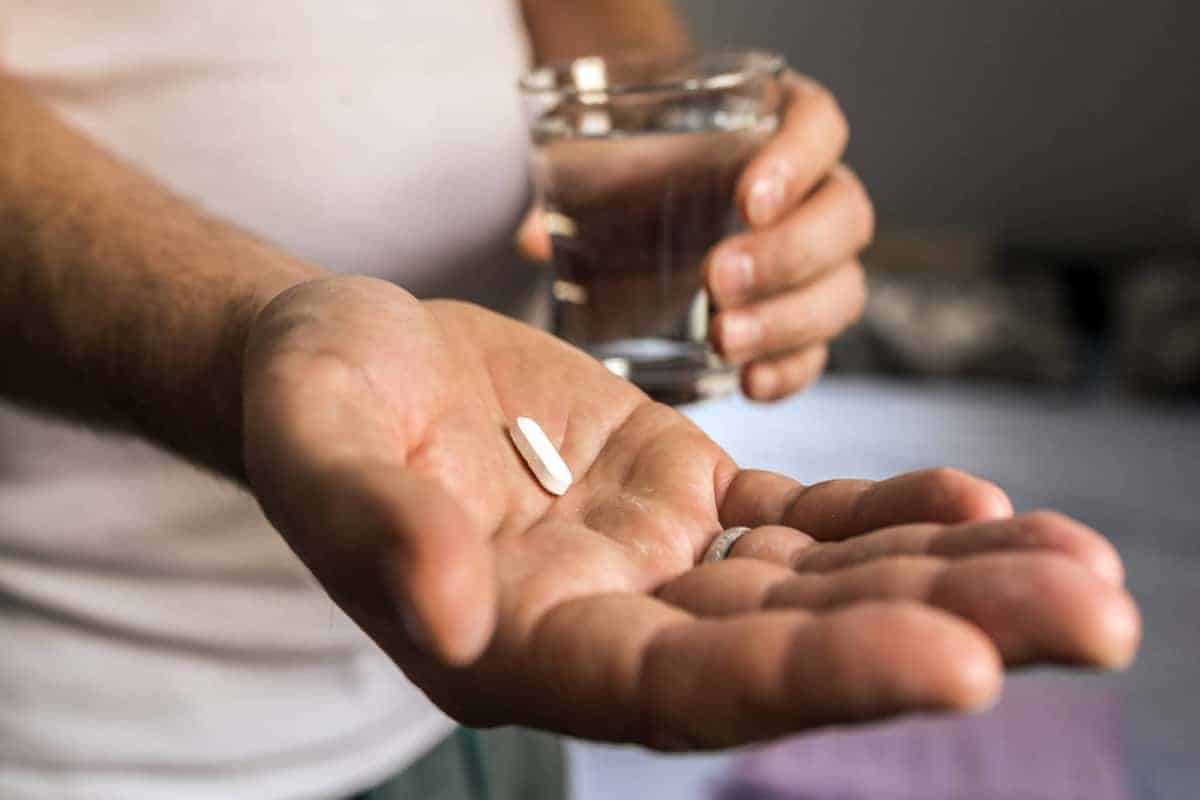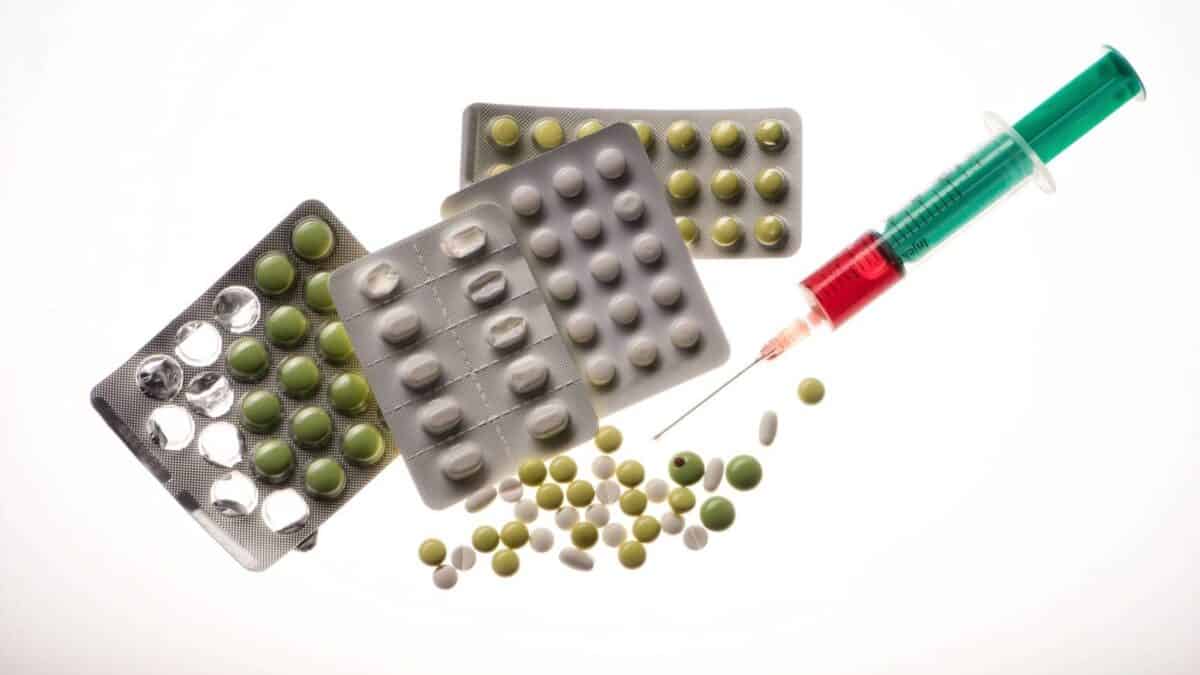Clenbuterol is a drug used in different contexts for its physiological effects. It is a substance that generates great controversy.
Below is a review of the mechanism of action, use, dosage, and physiological effects of clenbuterol.
What is clenbuterol?
Clenbuterol is a compound that has potent anabolic effects and reduces body fat.
It is a non-selective beta receptor agonist substance, meaning it has specific affinity for one of the beta receptor subtypes. It interacts with these receptors, acting preferentially on beta-2 adrenergic receptors, but also on beta-1 and beta-3 adrenergic receptors.
It is used and has been used in the medical field in humans as a bronchodilator due to its effects as a sympathomimetic drug, to treat respiratory diseases (bronchial asthma, asthmatic bronchitis, and spastic among others). (1,2)
[article ids=”80524″] Traditionally, clenbuterol has been used to increase weight, specifically the lean mass of cattle. Currently, it is an illegal drug (at least in most developed countries), which can only be used in specific cases under medical prescription.
Despite being a “prohibited” substance, it is still used mainly in the bodybuilding sector due to its referred effects given its potent effects on body fat loss and both in the preservation of muscle mass during caloric deficit periods and in muscle mass gain. (3)
Below is an image showing changes in lean body mass (LBM) after ingesting 40mcg of clenbuterol in the first seven days and 80mcg during the following eleven weeks in patients with chronic heart failure. (4)

How does clenbuterol work?
Clenbuterol, as already mentioned, is a β-adrenergic receptor agonist substance that interacts with both β-1 adrenergic receptors (in the heart), β-2 (bronchial smooth muscle and skeletal muscle), and β-3 (skeletal muscle and fat tissue).
These interactions, depending on the tissue and cells where it acts, cause an increase in heart rate, contraction strength, and conduction speed in the case of the heart.
It also produces arterial vasodilation, which translates into increased blood flow and reduction of diastolic blood pressure. Additionally, it produces relaxation of bronchial and gastrointestinal smooth muscle among others. (5)
At a more molecular level, clenbuterol acts by inducing muscle protein synthesis through the mTOR complex, a very important protein closely linked to anabolic processes.
It has also been observed that there is an induction of histone demethylase through the phosphorylation of CREB (a protein that acts as a transcription factor), which promotes an increase in androgenic signaling.
All this would favor an environment of muscle mass gain, increased lipolysis, and body fat loss after clenbuterol ingestion. (3)
Incrementa tu rendimiento y consigue tu mejor nivel cuidando tu alimentación y ayudándote de suplementación. Te mostramos todas las claves para mejorar tu alimentación de deportista
Todas las claves para mejorar tu alimentación de deportista. Mejora tus conocimientos de forma práctica y descubre las nuevas tendencias en nutrición deportiva.
Clenbuterol dosage and intake protocol
Even if there is a dose at which these adverse effects might not occur, its intake is not recommended unless prescribed by a specialist doctor to treat a specific condition that requires its use.
And it should always start with lower doses and establish each individual’s tolerance to avoid reaching doses where side effects outweigh the beneficial effects. (3)
Given the effects that clenbuterol presents as a muscle mass increaser and body fat reducer, it has been and is used by athletes and bodybuilders as an anabolic substance at doses of 60 to 160mg both in one or divided into different intakes.
Clenbuterol toxicity
Clenbuterol has a half-life of 25-40 hours and with high bioavailability, making it easier for its concentration to remain longer in the blood, being able to act on β-adrenergic receptors, producing its effect.
This can lead to an overdose of intake, leading to the adverse effects of clenbuterol consumption.
Some of the adverse effects reported in humans are restlessness, tachycardia and tachyarrhythmias, myocardial ischemia, gastrointestinal disturbances, and rhabdomyolysis, and metabolic alterations such as hyperglycemia and hypokalemia. (6,7)
As can be seen, clenbuterol is toxic to humans, and if the dose is not known and not taken under medical prescription, it can cause significant problems.
For this reason, care should be taken when consuming beef from a farm where cows or other animals treated with clenbuterol are raised to obtain the aforementioned benefits.
This practice can be dangerous for humans, as it could present a dose higher than tolerated after consuming contaminated meat. (5,8)
Clenbuterol and anti-doping
The World Anti-Doping Agency or WADA, for its acronym in English, establishes a list of prohibited substances every year in which clenbuterol is also included.
Which can be used by athletes who suffer from asthma or respiratory system problems at specific doses (maximum dose of 1600 micrograms every 24 hours, in divided doses not exceeding 800 micrograms over 12 hours starting with any dose). (9)
Currently, clenbuterol does not have an intake range nor is there any situation in which this substance can be used.
Nor is there a plan for review and update on the possibility of its use by athletes due to the effects its intake produces. (8)
Despite being completely prohibited in athletes for being considered a doping substance, there are several cases of athletes who have tested positive for clenbuterol consumption, some of whom have claimed meat contamination included in their diet.
Whether true or not, testing positive for clenbuterol is considered doping and therefore has a sanction.
Clenbuterol residues are detectable through some of the substance detection methodologies (gas chromatography and liquid chromatography techniques with mass spectrometry detection, or immunological techniques like ELISA and RIA).
It can even be detected in hair when there is continuous use of it, which signals that the athlete has consumed it repeatedly, which can also be evaluated through urine analysis when conducting an anti-doping control. (10)
Bet on testosterone boosters
Testosterone boosters are supplements believed to help increase the body’s testosterone levels.
They are usually natural compounds like herbal extracts and have been used in traditional medicine.
The testosterone boosters are supplements believed to help increase the body’s testosterone levels. They are usually natural compounds like herbal extracts and have been used in traditional medicine.
For many years, tribulus terrestris has been considered a testosterone booster.
Where to buy tribulus terrestris?
Below we leave you an excellent option. Each dose is made with 2250 mg of the best concentrated natural extract of Tribulus Terrestris fruits with a 90% concentration in Saponins, equivalent to 2025 mg of active ingredient.
👌 EXCELENTE FÓRMULA a base de extracto natural de los frutos del Tribulus Terrestris con 90% de Saponinas. | Ayuda a aumentar la testosterona, incrementar la masa muscular, la fuerza, la resistencia y el rendimiento físico. | GRAN CANTIDAD DE PRODUCTO AL MEJOR PRECIO: Ofrecemos 180 cápsulas veganas por bote, suministro para 2 meses.
Conclusions
In some countries, the use of clenbuterol in food-producing animals is prohibited due to potential health risks to consumers.
Human consumption of meat contaminated with clenbuterol can cause adverse health effects, such as tremors, headaches, and heart palpitations.
Clenbuterol intake has potent effects both in terms of muscle mass increase and body fat reduction.
However, it has significant side effects, making clenbuterol a substance to be very careful with.
For all these reasons, it is considered in most countries and in the sports field as a “prohibited” or doping substance.
Podcast “What is Clenbuterol and what dangers does it entail?”: Play in new window |
Subscribe to Apple Podcasts | Spotify | Google Podcasts |
Bibliography
- Prather, I D, D E Brown, P North, J. R. W. (1995). Clenbuterol: a substitute for anabolic steroids? – PubMed. Medicine & Science in Sports & Exercise.
- Clenbuterol. (2015). Vademecum. https://www.vademecum.es/principios-activos-clenbuterol-r03cc13
- Frank, K., Patel, K., Lopez, G., & Willis, B. (2020). Clenbuterol Research Analysis.
- Kamalakkannan, G., Petrilli, C. M., George, I., LaManca, J., McLaughlin, B. T., Shane, E., Mancini, D. M., & Maybaum, S. (2008). Clenbuterol increases lean muscle mass but not endurance in patients with chronic heart failure. The Journal of heart and lung transplantation: the official publication of the International Society for Heart Transplantation, 27(4), 457–461.
- Garzón-Sánchez, E., Hernández-Lira, S., Reyes-Hernández, U., Hernández-Lira, I., Reyes-Hernández, D., Reyes-Hernández, K. L., Reyes-Gómez, U., & Baylon-Hernández, A. (2016). Clenbuterol and its Risks in Sports. Bol Clin Hosp Infant Edo Son.
- Brett, J., Dawson, A. H., & Brown, J. A. (2014). Clenbuterol toxicity: A NSW Poisons Information Centre experience. Medical Journal of Australia, 200(4), 219–221.
- C Pulce, D Lamaison, G Keck, C Bostvironnois, J Nicolas, J. D. (1991). Collective human food poisonings by clenbuterol residues in veal liver – PubMed. Vet Human Toxicol.
- WADA statement on clenbuterol | World Anti-Doping Agency. (n.d.). Retrieved March 21, 2021.
- Beta-2 Agonists | World Anti-Doping Agency. (n.d.). Retrieved March 21, 2021.
- Parr, M. K., Opfermann, G., & Schäänzer, W. (2009). Analytical methods for the detection of clenbuterol. In Bioanalysis (Vol. 1, Issue 2, pp. 437–450). Future Science Ltd.





